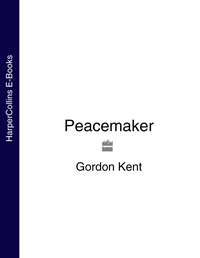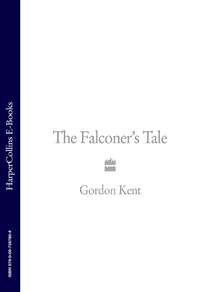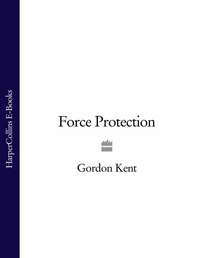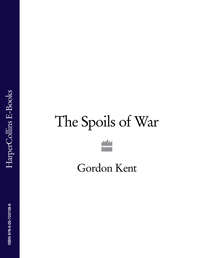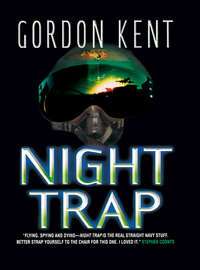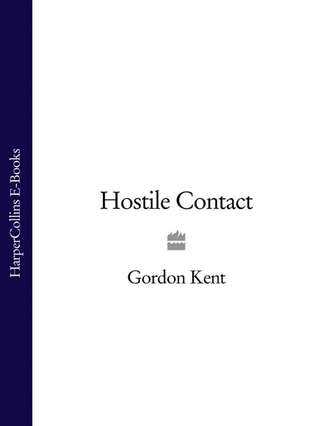
Полная версия
Hostile Contact
Jerry settled himself on the platform. He had plenty of time to arrange the matting and lie flat so that only a foot of the barrel protruded over the edge, and two small dead shrubs served to camouflage his body. The mat smelled of rice and curry and sweat and dog shit.
Dukas would appear there, and he worried about how little time he would have to shoot. Plus, now he would have to identify the guy. Then the main door opened, and he saw a furtive movement. Then the west door opened, and he saw another movement. Jerry brought the rifle around slowly and settled it on a half-hidden figure. The head was turned as if the man was speaking to someone just outside the door, but Jerry knew him before the face turned, clear in the crosshairs, and Jerry’s lips moved.
Jesus.
Jerry Piat had worked Jakarta long enough to know most of the Chinese embassy watchers by sight, and he certainly knew the team leader when he saw him.
What the fuck were the Chinese embassy goons doing here?
Alan entered the Orchid House too fast, minutes early, and forced himself to slow down. He realized that he had not really expected this meeting to happen at all. Now it was real because of the man with the camera he had seen outside, and he felt exposed. He felt a wave of vertigo. He slowed his pace still further and forced a smile to his face. He began to smell the orchids, and he forced himself to stop and read the cards, admire the rich colors and marvelous shapes. He was so early that he would have to smell every flower on the path to get to his appointed spot at the right time. He dawdled, nervous and bored at the same time.
It was a nightmare.
Qiu had a hand around his left biceps. Qiu had a copy of The Economist in his other hand, also the side on which he wore his watch, which he now raised to read. He held Bobby in place, watching the seconds tick off. Bobby wanted to scream at him—he was wasting time that Bobby could use to find the American inside the Orchid House!
“I will go inside in precisely two minutes and twenty seconds,” Qiu said to the watcher by the door. He gave Bobby a shove and let go of his arm. “You stay out of my way!”
Bobby ran for the south entrance, all the way around the building.
Now he was in for it.
Jerry saw the man with the bandaged hand framed in the bright sunlight of the east door.
Jesus, this thing is fucked.
Jerry’s mind was racing through the ramifications of a Chinese surveillance team. Now he had to think who the man with the bandaged hand was. Not your typical NCIS special agent. Military. Fairly recent wound—from the dustup when they’d brought down Shreed? It must be Craik. He checked the face against his memory of the old squadron photo. Where was Dukas? Why were the fucking Chinese here?
They could have followed Bobby Li, but his tradecraft made that unlikely. They could be here for another reason entirely. Or one of his own could have brought them. Like Ho. Or—he hated the idea, but he had to consider the possibilities—Bobby Li.
What didn’t occur to him, nonetheless, was that it was his own signal, which he had used to draw Craik and Dukas to Jakarta, that might also have drawn the Chinese. It didn’t occur to him then, because, if it had, he would have had to consider that George Shreed had actually been a traitor.
Qiu entered on the second and hurried down the path, wondering where his team was, why none of them was supporting him. He stopped to photograph an orchid, allowing himself twenty seconds of the three minutes’ time he had scheduled for the approach to the site. The other man would be doing the same. He was suddenly scared. These tough CIA Americans were legendary—beautifully organized, skilled, always dangerous. Where was his team, now that he thought of it?
He looked around. Leaves and flowers were everywhere, like a nightmarish wallpaper; then, glimpsed through them, he saw faces, a hand, an ear. One of his own people? The other side’s? He moved more slowly.
Jerry saw somebody flash in and out of his chosen killing ground, and he hesitated. His crosshairs registered on the back of Craik’s neck and his finger took up the slack of the trigger, but he hadn’t decided.
Somebody seemed to step toward Craik—a dark shape, hanging back on the left side of the bench. Jerry saw black hair. Bobby.
Alan got to the edge of the clearing in the center of the maze. A man in a windbreaker was there just ahead of him, panting as if he had been running. He had The Economist. Alan shifted his own copy to make sure it would show.
The other man’s eyes were wide, almost crazed. His first meeting, Alan thought.
“You ever go AGIP party?” the man croaked at him. That was not quite the code. “AGIP Christmas party” was the code.
Oh, shit.
Bobby Li had reached the edge where panic becomes madness. Qiu was inside by now, and the American was standing across the space that Bobby knew was Andy’s window on the meeting. If Bobby took another step, he would be visible to Andy. Shoot, he thought. Shoot the American! His life, his family, his future hung on a gunshot. All because of—not because of Andy. Not because of George. Because of these two outsiders in this Orchid House in this foreign place—these interlopers, these meddlers, these oppressors—
“Did I see you at AGIP Christmas party?” he cried, realizing he had said the code words wrong.
The American across the open space looked relieved. He, too, was carrying The Economist. He gave the reply signal: “I was with a Dutch girl.”
Shoot! Bobby screamed inside his head. Did he say it aloud? No. And then he saw Qiu coming up behind the American. Bobby had the envelope full of newspaper in his hand and he stuck it out, shaking so hard the paper inside rustled and crackled. “Take it!” he cried. “Gift—for you—take it!”
The American put out a hand, but didn’t take it.
And Qiu, eyes horrified, backed against the wall of plants as if to sidle around the American, but what he was looking at was The Economist in Bobby Li’s left hand.
Bobby went over the edge.
It was Qiu. It was all Qiu’s fault.
Bobby flipped the safety on the Walther and began to shoot.
The Chinese man made a little “O” of surprise, and the American dove over a table of orchids.
Bobby just went on shooting. Three into Qiu, two down the path, one where the American had disappeared, one into Qiu again, and the slide locked open because the clip was empty.
Jerry heard the first shot and had a dizzy moment when he thought he had pulled his own trigger, and then he recognized the smaller, sharper report of a handgun. Shot after shot. Jesus! Then the Orchid House erupted in shooting, at least three guns on the north, west, and northeast. Glass began to break overhead and shower down.
It was a bust.
He rolled the gun in the mat and threw junk over it and swung himself off the platform.
Alan landed on his maimed hand and fire raced up his arm, but he rolled clear of a tangle of flowers and raced down the maze. The bastard had a gun, had fired at him. But how could he have missed?
Alan could hear at least three guns firing then, not all together, but two of them were close. He pressed past a tool shed and grabbed a pair of wicked-looking scissors from a table. Any port in a storm. Another shot was fired, so close that he saw the muzzle flash through the flowers and realized that he was separated by only a screen of plants from the main trail. He couldn’t tell whether the shot had been fired at him or not, but he flung himself around the next corner.
Bobby Li heard the shots as if through deep water, as if they were fired by somebody else. The young Chinese was down, lying on the trail, and Bobby headed for the west exit. He thought he was safe unless Andy had actually seen him fire the gun. If he hadn’t, Bobby could blame the shooting on the American. He could say that the American had shot Qiu.
But suddenly there was more shooting, all around him. Qiu’s team were now shooting at Andy’s team, and he was in the middle.
Alan moved through the maze of trails, unable to consider anything beyond his next cover. His hand pulsed with pain as he stumbled through a display, knocking plants in all directions. He threw himself behind a collection of tools and handcarts right at the edge of the greenhouse wall, determined to get his bearings before panic and paranoia eliminated his ability to think. He lay panting, trying to be silent. There was another shot. Were they shooting at him? He couldn’t seem to see the moment of the meeting, as if he had a spot of amnesia around the first shot.
Something had gone horribly wrong. But the man in the windbreaker had known the signal. And then the shots—now it was coming back—and a man behind him going down, and the guy in the windbreaker still shooting. At Alan, yes, he thought so, yes. But not really aiming. Looking—crazy. He lay still, his lungs going as hard as if he had run five miles, and tried to imagine where the shooters were, and what they were after. They had to be shooting at each other. There was no cover. The plants offered concealment, but in the whole building there wasn’t anything that would even deflect a small-caliber pistol bullet. Only the screen of the plants separated the trails. Alan thought there were at least four shooters, spread across the hall. Somewhere, one of them fired and a bullet hit the glass above him, and the whole pane crazed, lines of cracks spreading out to the frames.
Part of him wanted to stay and solve the puzzle, but that last bullet made up his mind. Time to go. And he realized that he was thinking again, not simply reacting.
He reached across, tore at a wheelbarrow with his good hand and tipped it, with its load of tools, squarely across the path. Then he pushed with his bandaged hand against the shattered pane of glass until pieces began to break out of the frames, and in a moment he had cleared it, although his hand was screaming and there was blood on his arm. There was another shot from twenty meters off, hidden several folds in the trail away. A potted plant burst, spraying him with loam and plant matter.
He rolled through the hole he had made and remembered to hold his maimed hand close with the other as he went. His shirt tore and a pain cut like fire across his back as he scraped through the frame. He fell much farther than he had expected and landed hard on his back, the wind knocked clean out of him. So many things hurt that his hand had to struggle to be heard. He rolled on to his knees and pushed himself to his feet, already plotting his path to the parking lot.
The shooting had stopped, and he had to consider that he had been the target, and he had to wonder if there were more of them outside, on the trails and in the parking lot. He balanced waiting in hiding, perhaps in the foundations of the Orchid House, against a run for the parking lot, if he could even run. Despite the pain, the desire for movement won. He’d be damned if he’d wait for them like a cornered rat. He might surprise them. He moved cautiously around the base of the Orchid House wall and then crossed the open ground to the first of the high-peaked roofs of the traditional buildings he had seen. He surprised the schoolgirls there, and his torn shirt and blood and the wildness of his expression shocked them. He took them as a sign he was safe for a moment and he ran along the gravel path, heedless of the looks that other visitors gave him until he made it to the parking lot without another shot being fired.
The cabdriver didn’t want him, but Alan shoved cash into his hands and made noises until the cab was moving. He had good instincts, but, because he lacked training and was preoccupied with his injuries, he didn’t see a car follow him out of the lot.
Bobby Li held out all the rest of his American bills as he and Ho collided. Ho grabbed the money and tossed the camera. He was fast for a big man, gone while Bobby was retrieving the camera. Men were pouring out of the Orchid House like ants; a woman was screaming somewhere near the food concession. Small, hollow-cheeked Indonesian men were turned, eyes wide, toward the Orchid House.
He had to get rid of the gun. He had to get out of Jakarta. He had to change his life.
But he hadn’t betrayed Andy or George Shreed with the truth.
Jerry held his ground until the building was clear. He should have left as soon as he saw the Chinese. He should have shown Bobby Li exactly where to stand. He should have had a better escape route. As it was, he was one step ahead of the Jakarta police. His mind reground the facts on and on, and he blamed himself, and he needed a drink. They all went together.
7
Washington.
Dukas got the call on his cell phone from the NCIS duty officer when he had been asleep at his desk and was dreaming of a house and a dog and was happy, perhaps because he didn’t own a house or a dog and these two seemed particularly congenial.
“You have a secure call.”
“Oh, shit.”
Oh, shit. He knew only one person who might want to call him at the office at eleven at night, and there wasn’t supposed to be any reason for him to call.
“What’s the number?” he said to the duty officer.
“US embassy. Naval attaché.”
Oh, double-shit.
“Dukas, NCIS, I have a message to call you.” There was the usual confusion, nobody at the other end ever having heard of him, and then they found the person who had asked him to call, a lieutenant-commander who asked him to wait, and then Alan came on the line.
“Hey, Mike. You secure?”
“Can’t you tell by the sound? You sound as if you got your head in a fifty-five-gallon drum. What’s up?”
“Somebody started shooting.”
Dukas felt his heart squeeze. “Oh, Christ, Al—”
“I left the mark, no sweat, and then I went to the meeting we said was going to be a piece of cake, and all hell broke loose.” He told it quickly to Dukas, what he knew of it from his point of view. “I’m sorry if I screwed it up, Mike.”
“But you’re okay?”
“Yeah, I’m fine, except for my self-esteem.”
“Where’s Triffler?”
“Good question.”
Dukas felt his blood pounding in his ears. He squeezed his eyeballs with his fingers and felt horrendous guilt. That Craik was okay made him no less guilty: he’d sent a good man into a bad place. “God, I’m sorry,” he said.
“I volunteered.”
“Yeah, but—you tell the local cops?” Dukas said.
“I came to the embassy; I didn’t know what the hell was going on. They’ve dealt with the locals.”
“Come home.”
“I hear the ambassador’s really ripped—”
“Come home!” Dukas was thinking fast, thinking about his mistake, about something that had seemed small and easy and was actually big and dangerous. “Come home now.” He saw that his hands were trembling. “Put the lieutenant-commander back on.”
Dukas asked the Jakarta attaché to put Alan on the first flight out to anywhere and to provide protection until they were in the air. “This a matter of national security?” the man said. He wasn’t unwilling, only a little jaded. Dukas gave him his full name and number and the case number he’d given the Sleeping Dog file, and he told him that, yes, it was a matter of national security.
After he’d hung up, he sat staring at the wall of the duty office for fifteen minutes, and then he went along dimly lit corridors to his own office and spent the rest of the night there. First, he tried to figure out how a meeting taken from a long-dead comm plan could go bad, really bad, because he had been sure that nobody would show, sure that the mark itself would go unnoticed. The answer was now easy: because the comm plan had been planted on him and he’d been suckered by it, and the intention had always been that it would go bad.
But who had planted it on him?
The easy answer was Shreed’s control, who must have had a copy—but how did a Chinese intel officer insert a comm plan into a dead CIA file, and then get it sent to Mike Dukas?
It didn’t make sense. Especially since Shreed’s control was probably dead himself, because the last Dukas had seen of him, he was lying face-down in a village in Pakistan with a hole in his back.
Then Dukas spent the rest of the night going through Sleeping Dog, which was supposed to be moribund but suddenly wasn’t.
Dar es Salaam.
Colonel Lao had been in his office before the African dawn had broken, because the first meeting time in Jakarta had been close and he wanted to be there for a report. The report would be negative, he had thought: surely whoever had left the mark in Jakarta would pass up the first meeting time, perhaps appear for the second or third. Yet his secure phone had sounded only fifteen minutes after the scheduled time, and his face had registered the horror he had felt as he had heard the report of the whole bloody, blown operation.
“Who shot first?” he said, hardly able to keep his rage out of his voice. On the other end was the Chief of Security at the Chinese embassy in Jakarta, a man who at that moment was facing the loss of his career and knew it. His answer was evasive; Lao excoriated him.
“How can you be sure there was an actual meeting?” Lao demanded. He was certain that there could be only two people who knew the American Go plan other than Lao himself—Chen and Shreed. When the officer insisted that a Westerner had appeared at the appointed time and place, Lao thought he saw it more clearly: Shreed had sent a substitute, meaning that he was alive and thought that Chen was, as well. Had Chen been there? Chen’s surrogate?
“Did you have the wits to identify anybody?” Lao growled. So much confusion, the officer whined, and there was shooting—unknown entities, Indonesians working perhaps for the Westerner or the Chinese, undoubtedly counter-surveillance. The embassy hadn’t had enough men, and the man sent out from Beijing, Qiu, was an idiot who had antagonized the in-country team and then got himself shot dead. Time had been too short, and—his voice stronger as he began to shift the blame—why hadn’t Lao informed them earlier? And why hadn’t he expected violence? And after the whining, the face-saving, and the excuses, a nugget of useful fact: one of the in-country team had followed one of the Americans to a hotel. He didn’t have a name yet.
Lao sat up and asserted himself. “Did you get photographs? Did you get at least that much?” They had, he learned. “Send them to me at once—have them scanned at the embassy and encrypted. I want them on my desk in twenty minutes. And the ID on the man your one competent agent followed.”
The officer protested that the films hadn’t been developed; these things took time—and hung up.
It was another hour before Loyalty Man reported that his agent had been unable to identify the man at the meeting. He had been only some American.
Jakarta.
The balls-up at the Orchid House made Jerry Piat angry—enraged drunk was only a couple of swallows away. Well, there you were, in the pleasant fog of booze one second, full-bore rage the next. He was jolting through a bad part of Jakarta in a taxi, a pint of Scotch in his hand and his head full of murderous doubts. Something apparently easy had gone bad—Jesus, shooting! It wasn’t supposed to be a hostile meet, and somebody had started shooting! Of course, he had planned to do some shooting of his own, but that was different. He was a renegade, what the hell. And Bobby Li had gone missing; he hadn’t shown at their rendezvous spot and he didn’t respond to phone signals.
And, Piat was thinking, he was himself in deep shit with the people who had sent him to Jakarta in the first place. What would he tell Suter and Helmer?
Well, he could tell them that Craik had done it. Some kind of personal thing. Maybe something snapped, he just—
Bullshit.
He couldn’t help thinking that what it reminded him of was the Watergate break-in. The Gang Who Couldn’t Shoot Straight. Jesus.
He went through it step-by-step. He had put somebody to check at the cannon, and a guy had come and had left the mark, only it hadn’t been Dukas, it had been Craik, which Piat hadn’t known until too late. (First mistake.) Then, this morning, they’d been at the meeting place, just as they had planned, and the same guy, Craik, had showed up there. Okay. Ho had been ready with the camera inside the Orchid House, too, or so Piat had thought, except that Bobby hadn’t got the film to him afterward (second mistake), meaning that to date there were no good photos of Craik inside, actually meeting with Bobby Li, which was the object of the whole operation. That had been the object, anyway, back before he had got enraged-drunk and had decided to shoot the sonofabitch—to get a photo of Dukas or Craik with what would look like a Chinese agent, which was what Bobby Li was meant to look like. But somebody had started shooting, and now he had no photos at all. Zip.
How was he to know that a bunch of people—Chinese—would fucking start shooting?
The thought of it made Piat scowl into the humid heat: he had screwed up—forget the others, he was talking to himself about good tradecraft—he had screwed up, and he was ashamed. He had let the booze do his thinking for him, the booze and his loyalty to George Shreed, and he hadn’t been on top of things and they’d gone to hell.
But why?
It was really a double screwup: first, he hadn’t made sure himself that somebody competent would be taking the photos inside the Orchid House. In fact, he should have been on the camera himself and not dicked around with the fucking gun. And, second, he’d somehow overlooked the possibility that a third party would read the mark on the cannon and know that it signaled a meeting in the Orchid House—somebody Chinese, as it turned out. An idea zinged around his brain: we set up somebody to fake a meeting with a fake Chinese, and real Chinese show up. How the fuck did the Chinese know?
Something ugly sucked at his brain. Suspicion.
George Shreed had been accused of selling out to the Chinese. If he’d given the Chinese the comm plan—
He couldn’t let himself be sucked toward that. Any direction but that. Think of something else.
He’d lifted this old, dead comm plan out of the Canceled file and had laid it on Dukas because it was dead, because nobody else could know about it, because it had been Shreed’s creation and therefore beautifully ironic—Shreed striking back from the grave—and therefore it was a safe hunk of bait to lure Dukas into a trap. But somehow the Chinese had known about it and had shown up and had started shooting.
Part of his brain kept picking at the problem of how they could have known, and it was saying, People know about comm plans because they’ve either stolen them or been given them, and, because this was a George Shreed comm plan—But another part of his brain, the part that loved the late George Shreed, was saying, Don’t go there.
Piat sipped and admitted to himself that he wasn’t going to tell Suter and Helmer the truth. Nothing had happened in the Orchid House, he’d say; he hadn’t tried to kill Craik and failed. There hadn’t been any Chinese.
Think about Bobby Li, he told himself. Where the hell is he?
He changed taxis and directed the driver out to an old temple that stood on the edge of a colossal industrial park that was once going to make somebody fantastically rich and that had gone belly-up like the rest of Indonesia in the nineties. Nature was vengeful in Indonesia: give it a chance to take something back, and Nature moved fast. The industrial park looked now like a Mayan ruin, with small trees growing out of windows, and wild pigs running around the decaying roads.


